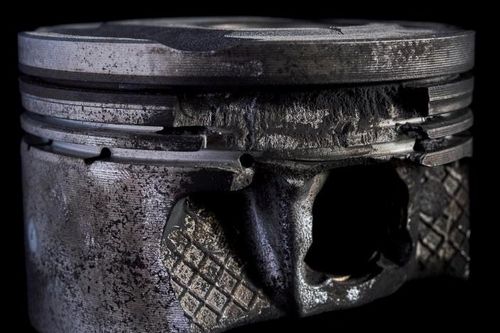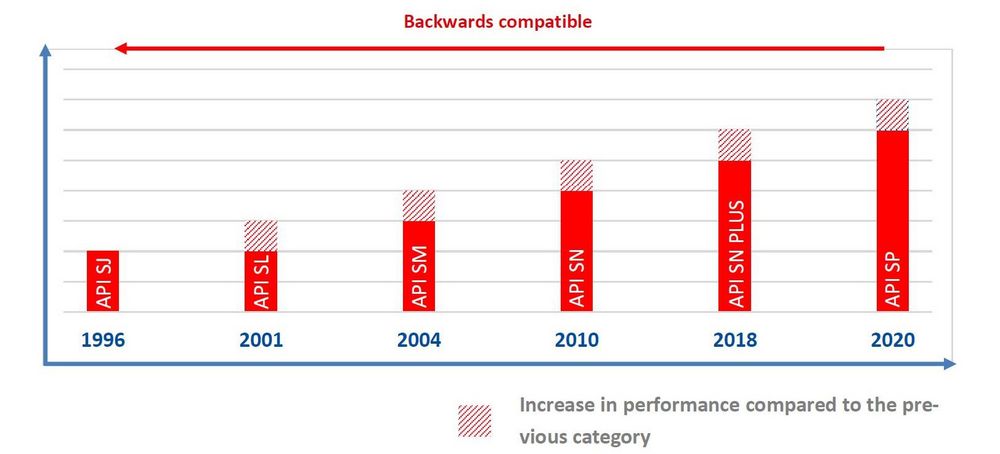Low Speed Pre-Ignition (LSPI)
General Information
Low Speed Pre-Ignition or abbreviated LSPI, describes unintentional and uncontrolled self-ignitions of the fuel-air mixture in the engine bevor the actual engine ignition. The premature ignitions occur primarily in supercharged gasoline engines with direct injection and turbocharging and can cause major damage to the engine. LSPI makes itself noticeable by a knocking noise, which has nothing to do with the well-known knocking of the engine. The knocking noise is caused by accidental explosions of the fuel-air mixture at low speed and high load. The effect is additionally favored by a cold engine, so that for example the morning drive from the underground car park up a steep ramp would be the worst-case scenario.

Pre-Ignition (LPSI) of an engine before the piston reaches his peak

Moment of ignition of an engine not susceptible to LSPI
Technical Background
What exactly happens during the pre-ignition process?
• In order to meet the strict exhaust emission limits published by the European Union, car manufacturers are striving, among other things, to achieve lower fuel consumption.
• This can be achieved by reducing the size of the engines (Downsizing)1, since the amount of CO2 emitted is related exclusively to the amount of fuel burned. In order to maintain the performance of the engines, turbochargers and direct injection are used.
• In addition, more and more low viscosity engine oils (e.g. SAE Classification 0W-12, 0W-16 or 0W-20) are being used to further reduce fuel consumption.
• Small particles, deposits and oil drops, that get in or are present in the combustion chambers, form socalled hotspots.
• Those hotspots, which act as ignition source before the planned ignition, lead to LSPI in the further course of the combustion process.
• The reason for the occurrence of LSPI is mainly due to the operating condition, to the design of the engine, its combustion strategy as well as the quality of the fuel used, but could not be finally determined yet.
• Apart from this, engine oil was discovered as another possible cause, which is why modern engine oils are tested for pre-ignition.
1 Downsizing describes the reduction of size of spark-ignited combustion engines in the form of cylinder reduction or engine displacement reduction while maintaining almost the same performance. The aim is to reduce the fuel consumption.
Occurring Damages
The damages caused by LSPI involve most times serious consequences and are usually immediately visible. In many cases the repair is very expensive, since most times total engine damages in shape of holes in the piston crown, burnt top lands, broken piston rings as well as damaged connecting rods and defective connecting rod bearing shells occur.

Reaction of Manufacturers and Associations
Some automobile manufacturers recognized early on that engine oils can have a negative effect on LSPI as well. Detailed studies and research have shown that certain engine oil components, such as calcium, favor the LSPI process. Automobile associations and vehicle manufacturers such as GM, Ford, Mercedes Benz, or PSA have already reacted and provided remedial measures. These resulted, among other things, in the introduction of new or updated engine oil specifications.
For example, GM responded to this by introducing an additional engine test, that simulates the engine's behavior at low speeds and high loads. The so-called “Pre-Ignition Test” measures the number of premature ignitions of the engine. In order to better differentiate the different requirements of the engines, the new oil specification "dexos1TM Gen 2" was introduced in 2015. This specification is specially designed for highly charged gasoline engines with direct injection. For diesel engines and gasoline engines older than 2010, the dexos2TM specification is still valid.
But not only General Motors also other automotive associations and manufacturers, such as the American Petroleum Institute (API), followed the lead and published specifications specifically aligned to LSPI. API introduced the new specification API SN PLUS. Compared to the previous API SN, this specification contains an additional engine test, which is intended to determine the frequency and probability of LSPI. The API SN PLUS specification is backwards compatible with all previous API S... specifications. In 2020 a new API specification API SP will most likely be introduced. The LSPI test will be included as well and API SP will also be backwards compatible.

In addition to the new GM / API specification, there are further specifications for engine oils that include an LSPI test:
| Association / Manufacturer | Specification |
|---|---|
| API | SN PLUS / SP (introduction 05/2020) |
| ILSAC | GF-6A & GF-6B (introduction 05/2020) |
| GM | dexos1TM Gen 2 |
| OPEL | OV 040 1547 / dexos1TMGen 2 |
| MERCEDES BENZ | MB 229.5 / MB 229.51 / MB 229.52 / MB 229.6 / MB 229.71 (since 11/2018) |
| PSA | B71 2290 / B71 2312 / B71 2010 |
However, the appearance of LSPI can not only be influenced by special engine oils, but also by fuel additives such as combustion engine cleaners.
FUCHS reacted very early to the change in requirements for engines affected by LSPI and introduced shortly after the publication of the new of the new dexos1TM Gen 2 specification TITAN Supersyn D1 SAE 0W-20 and 5W-30, which are specially designed to meet this specification. This pioneering position was used to apply the knowledge gained to other products and specifications, resulting in a distinctive portfolio of LSPI-reducing engine oils.
The following engine oils fulfills LSPI relevant specifications:
| Product | Specification |
|---|---|
API SP RC, MB-APPROVAL 229.71, OV 040 1547 | |
PSA B71 2312 | |
PSA B71 2290 | |
API SP RC, ILSAC GF-6A, dexos1 TM Gen 2 | |
API SP RC, ILSAC GF-6A, dexos1 TM Gen 2 |
In addition to the above-mentioned products, the FUCHS portfolio contains further products with a reducing impact on LSPI.
Your FUCHS Team Product Management Automotive
